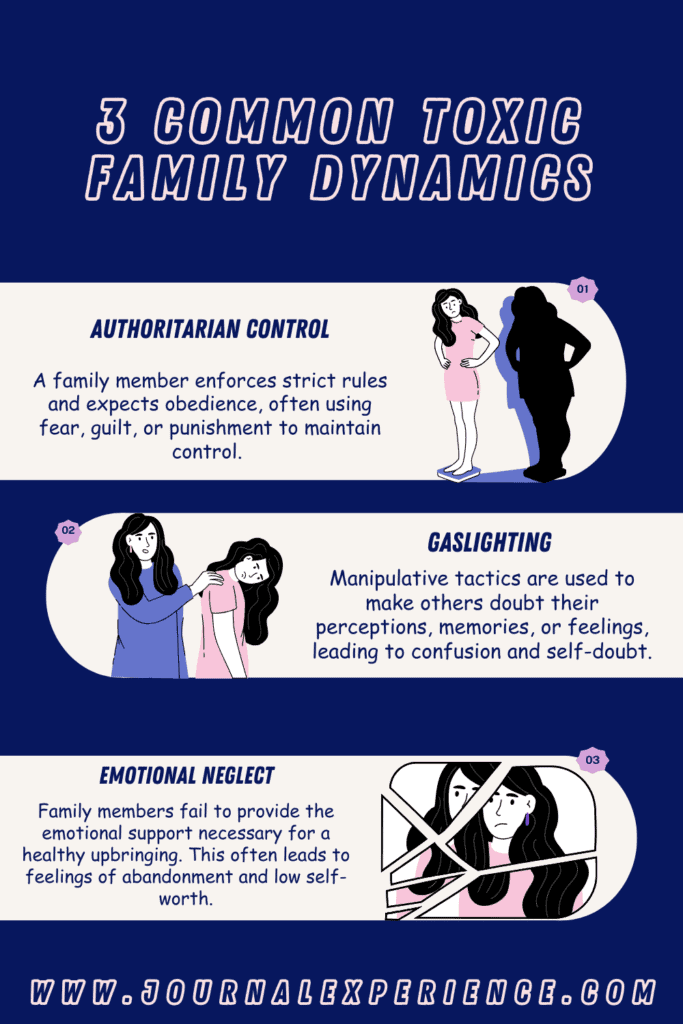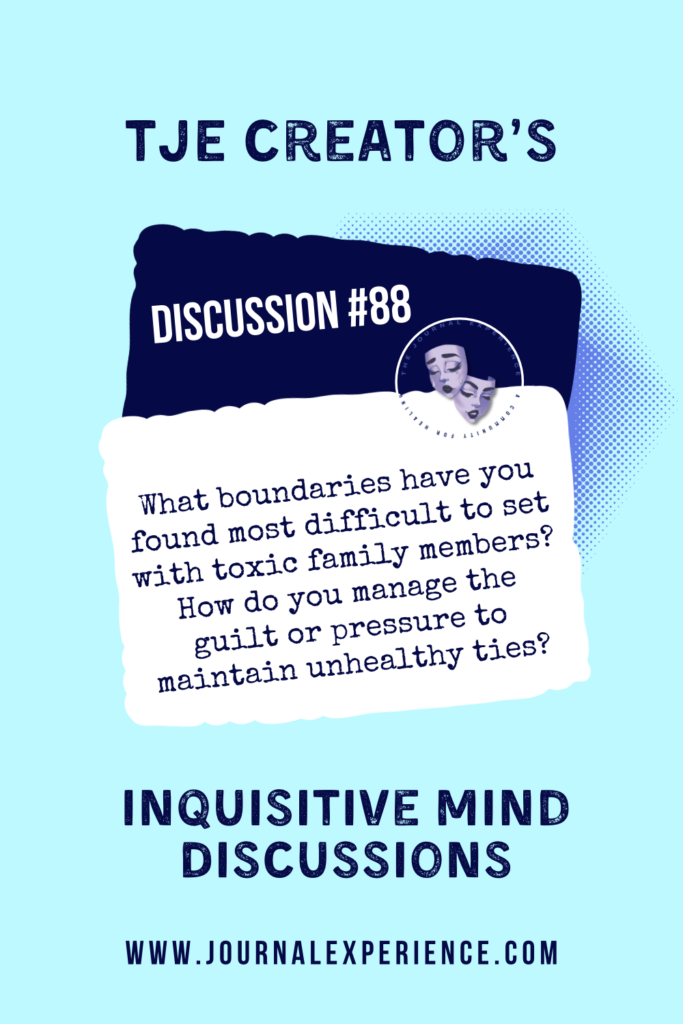Family relationships often serve as the foundation of love, security, and growth.

However, when these bonds become strained or toxic, they can deeply impact one’s mental health, emotional well-being, and personal development. Navigating these dynamics can feel isolating, but with the right tools, understanding, and support, healing is possible.
This post provides a comprehensive guide to understanding toxic family dynamics, recognizing harmful patterns, and learning effective strategies to manage and heal from these experiences.
Understanding Toxic Family Dynamics
Toxic family dynamics refer to patterns of behavior within families that cause emotional distress, hinder personal growth, and create an unhealthy environment. These dynamics often stem from poor communication, unresolved trauma, or unhealthy coping mechanisms passed down through generations.
Common Types of Toxic Family Dynamics:
- Authoritarian Control:
A family member enforces strict rules and expects obedience, often using fear, guilt, or punishment to maintain control. This leaves little room for personal freedom or growth. - Emotional Neglect:
Family members fail to provide the emotional support necessary for a healthy upbringing. This often leads to feelings of abandonment and low self-worth. - Favoritism:
Unequal treatment of siblings creates an environment of resentment, competition, and division. - Codependency:
Family members rely excessively on one another for emotional validation or physical needs, often at the cost of individuality. - Gaslighting:
Manipulative tactics are used to make others doubt their perceptions, memories, or feelings, leading to confusion and self-doubt.

Impact of Toxic Family Dynamics:
- Mental Health Struggles: Anxiety, depression, and chronic stress often emerge in toxic family environments.
- Difficulty Forming Healthy Relationships: Toxic patterns learned in childhood can lead to mistrust, insecurity, or a fear of intimacy in future relationships.
- Loss of Identity: Constant invalidation or manipulation can suppress individuality, leaving individuals unsure of who they truly are.
Recognizing these dynamics is the first step toward reclaiming your peace and fostering healthier relationships.
Signs of Toxic Family Relationships
It’s not always easy to recognize when family dynamics have crossed into toxic territory, especially when certain behaviors are normalized. Below are some common signs to help identify unhealthy relationships:
1. Constant Manipulation
Toxic family members may guilt-trip, lie, or use emotional blackmail to get their way. This creates a power imbalance and leaves others feeling controlled or used.
2. Excessive Criticism
Rather than offering constructive feedback, toxic individuals may belittle or demean others. This constant negativity can chip away at self-esteem over time.
3. Boundary Violations
Ignoring personal boundaries is a hallmark of toxic family relationships. Whether it’s prying into private matters or dismissing requests for space, this behavior undermines trust and autonomy.
4. Frequent Hostility
Toxic environments are often characterized by frequent arguments, yelling, or even physical aggression. This leaves family members walking on eggshells to avoid conflict.
5. Emotional Neglect
When family members dismiss or invalidate feelings, it can leave individuals feeling unsupported, invisible, and alone.
Understanding these behaviors helps validate your experience and empowers you to take action.

The Emotional Toll of Toxic Family Dynamics
Living in a toxic family can deeply impact your emotional well-being, leaving scars that take time to heal. Constant stress, lack of support, or hostility creates emotional exhaustion, confusion, and self-doubt. Over time, these effects shape relationships, decision-making, and overall happiness.
People-Pleasing
Growing up in a toxic family can lead to people-pleasing tendencies, where seeking approval becomes a way to avoid conflict. This can result in burnout, resentment, and unhealthy relationships with crossed boundaries.
Fear of Abandonment
Toxic dynamics may lead to a fear of abandonment, especially with emotional neglect. This fear can create anxiety in relationships, leading to clinginess or pushing people away to avoid hurt.
Hyper-Independence
Toxic environments often teach that relying on others is unsafe, leading to hyper-independence—avoiding help even when needed. While independence is valuable, it can hinder building meaningful connections or accepting support.
Emotional Dysregulation
Exposure to conflict or neglect can impair emotional regulation, causing overreaction to stress or emotional withdrawal. This makes navigating daily life and relationships more challenging.
Low Self-Worth
Toxic families often undermine self-esteem, leading to feelings of inadequacy. Belittling or favoritism can leave you questioning your value, impacting relationships and career opportunities.
Chronic Stress and Anxiety
Living in a toxic family often creates a constant state of hypervigilance, leading to chronic anxiety and physical stress. This can make it difficult to relax or enjoy life.
Difficulty Trusting Others
Toxic family dynamics can erode trust, making it hard to form authentic connections. You may second-guess people’s intentions, leading to isolation.
Healing is Possible
If these patterns resonate, know healing is possible. Recognizing the impact of toxic family dynamics is the first step to recovery. Therapy, self-compassion, and supportive relationships can help you reclaim your emotional well-being and build healthy, fulfilling connections.
If toxic family dynamics have left you emotionally exhausted, struggling with fear, or feeling disconnected from your authentic self, the Healing The Inner Trauma Child (HITCH) Method offers trans-formative support to help you heal inner wounds and rebuild your emotional resilience.
Dealing with Toxic Family Members
Navigating relationships with toxic family members requires courage, strategy, and a deep commitment to self-care.
1. Set Boundaries and Stick to Them
Boundaries are an essential tool for protecting your peace. Clearly define what behaviors you will and will not tolerate and communicate them assertively.
Examples:
- “I need time to process my emotions. I’ll let you know when I’m ready to talk.”
- “This conversation is not productive, and I’m choosing to step away.”
Consistency is key—enforcing boundaries can be challenging but necessary for change.
2. Prioritize Self-Care
Engage in activities that recharge your energy and bring you joy. Journaling, meditation, and creative outlets can help process emotions and reduce stress.
3. Limit Contact When Necessary
Sometimes, reducing interaction with toxic family members is essential for your mental well-being. This doesn’t mean you’re giving up on them—it means prioritizing your health.
4. Build a Support System
Seek support from trusted friends, support groups, or online communities like The Journal Experience, where you can share your journey and connect with others who understand.

Healing from toxic family dynamics often requires learning to rebuild emotional independence and set healthy limits. The Codependency Therapy | Self Love Recovery Treatment Program provides step-by-step guidance for breaking free from dysfunctional patterns and reclaiming your emotional autonomy.
Seeking Professional Help
While personal strategies are valuable, therapy offers a safe, structured space to unpack complex emotions and gain deeper insights.
Benefits of Therapy:
- Clarity: Understand the root causes of family dynamics and their impact on you.
- Validation: Feel seen and supported as you process difficult experiences.
- Skill-Building: Learn communication and conflict-resolution strategies tailored to your needs.
Recommended Approaches:
- Individual Therapy: Focuses solely on your experiences and healing journey.
- Family Therapy: If appropriate, involves multiple members to address issues collectively.
- Trauma-Focused Therapy: Targets the emotional wounds caused by toxic relationships.
Practical Steps to Heal
Healing from toxic family dynamics is a personal journey that requires time, patience, and intention. Here are some actionable steps:
- Acknowledge Your Feelings
It’s okay to feel hurt, angry, or even confused. Suppressing these emotions only delays healing. - Practice Self-Compassion
Treat yourself with kindness and remind yourself that you’re not to blame for others’ behaviors. - Educate Yourself
Read books, listen to podcasts, or explore online resources about toxic family dynamics to gain deeper insights. - Focus on Growth
Engage in activities that foster your independence and joy, such as pursuing hobbies, advancing your career, or traveling. - Celebrate Small Wins
Every step toward healing—whether it’s enforcing a boundary or speaking up—is a victory worth acknowledging.
Breaking Generational Cycles
Breaking free from toxic family dynamics is about more than personal healing—it’s about creating a healthier legacy for future generations. Generational cycles of dysfunction often persist because harmful behaviors and beliefs are passed down unconsciously. By recognizing these patterns and committing to change, you can break the cycle and foster love, respect, and understanding in your family.
Breaking generational cycles begins with understanding how dysfunction is passed down. The Webinar: Origins of Codependency and Pathological Narcissism offers critical insight into how early family dynamics shape emotional patterns—and how to consciously create healthier legacies.
Understand the Root Causes
Reflect on the origins of toxic dynamics in your family, whether they stem from trauma, poor communication, or cultural norms. Acknowledging these roots allows you to approach the issue with compassion while empowering you to stop the cycle.
Commit to Healing
Personal healing is essential. Therapy, mindfulness, and self-reflection help you process pain and unlearn toxic patterns. As you heal, you stop projecting past wounds onto others, setting a healthier example for those around you.
Model Healthy Behaviors
Learn and demonstrate positive relationship skills like active listening, conflict resolution, and emotional validation. Children and younger relatives absorb what they see—your actions can shape their understanding of healthy relationships.
Set Boundaries
Redefine family relationships by setting firm but loving boundaries. Teach others what respectful interactions look like and hold them accountable while protecting your well-being.
Create a Legacy of Love
By healing and modeling healthier dynamics, you leave future generations with a foundation of emotional safety and mutual respect. Breaking the cycle is challenging but deeply rewarding, creating a family culture of growth, understanding, and care.
Overview
Managing toxic family dynamics is no easy feat, but it’s a courageous step toward reclaiming your life and well-being. By understanding toxic behaviors, recognizing their impact, and taking proactive steps to address them, you can find freedom and healing.
If you’re dealing with toxic family relationships, you’re not alone. The Journal Experience offers a supportive community and resources to help you on your healing journey. Become a member today to connect with others, access guided journals, and gain valuable insights, or subscribe to the TJE Newsletter for weekly inspiration and tools to empower your growth. Join the experience and take the first step toward breaking free today.